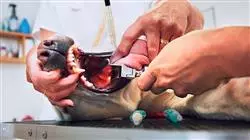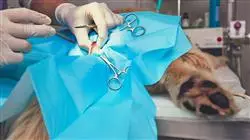University certificate
The world's largest faculty of veterinary medicine”
Introduction to the Program
Acquire the fundamental knowledge and skills of initial patient care and the diagnostic and therapeutic procedures needed in the most common emergency situations”

In emergency medicine there is a series of understandings, procedures and techniques which are common in the majority of cases, independent of the specialty or specialties involved in each case. Across ten comprehensive modules, we will develop the fundamental concepts to help veterinarians to carry out clinical activity in emergency services. We will approach topics such as the correct triage management of patients, how to take a correct medical history, how to perform an initial examination and a detailed explanation of the most relevant techniques and tests for attending to a critical patient. Likewise, management guidelines are established to facilitate working with difficult patients.
We will cover how to approach patients who arrive at the center with acute problems such as pneumonia or pulmonary thromboembolism, or with aggravated or complicated secondary chronic problems, such as feline patients with asthma or dogs with heart failure and respiratory complications. We will also cover procedures for caring for patients with cardiovascular problems from their arrival at the emergency department, their initial stabilization, through to complementary tests and subsequent medical treatment.
Veterinary professionals will acquire the latest knowledge in Small Animal Emergencies thanks to this comprehensive program. All of this is presented in a 100% online format, which offers you the possibility to study anywhere, allowing you to adapt your study schedule to other aspects of your life. In short, it offers the most complete program in which we cover all the areas of knowledge you need in order to become the best prepared specialist.
You will learn about the procedures used in Emergency Respiratory situations, thereby perfecting therapeutic procedures”
This Master's Degree in Veterinary Emergencies in Small Animals contains the most complete and up-to-date scientific program on the market. The most important features include:
- The latest technology in online teaching software
- A highly visual teaching system, supported by graphic and schematic contents that are easy to assimilate and understand
- Practical cases presented by practising experts
- State-of-the-art interactive video systems
- Teaching supported by telepractice
- Continuous updating and recycling systems
- Autonomous learning: full compatibility with other occupations
- Practical exercises for self-evaluation and learning verification
- Support groups and educational synergies: questions to the expert, debate and knowledge forums
- Communication with the teacher and individual reflection work
- Content that is accessible from any fixed or portable device with an Internet connection
- Supplementary documentation databases are permanently available, even after the program
Acquire the skills required to practice as an expert in the field of Veterinary Emergencies in Small Animals by mastering the latest techniques and advances in this type of intervention”
The teaching staff includes leading professionals who contribute their experience to this educational program, as well as renowned specialists belonging to leading societies and prestigious universities.
The multimedia content developed with the latest educational technology will provide the professional with situated and contextual learning, i.e., a simulated environment that will provide an immersive educational experience to learn in real situations.
This program is designed around Problem-Based Learning, whereby the professional must try to solve the different professional practice situations that arise throughout the program. For this purpose, the physician will be assisted by an innovative interactive video system developed by renowned experts in the field of veterinary medicine who have extensive teaching experience.
This Master's Degree in Veterinary Emergencies in Small Animals will take you through different teaching approaches which will allow you to learn in a dynamic and efficient way"

You will be provided with multimedia tools meticulously designed by experts, which will favor the speed of assimilation and learning"
Why study at TECH?
TECH is the world’s largest online university. With an impressive catalog of more than 14,000 university programs available in 11 languages, it is positioned as a leader in employability, with a 99% job placement rate. In addition, it relies on an enormous faculty of more than 6,000 professors of the highest international renown.

Study at the world's largest online university and guarantee your professional success. The future starts at TECH”
The world’s best online university according to FORBES
The prestigious Forbes magazine, specialized in business and finance, has highlighted TECH as “the world's best online university” This is what they have recently stated in an article in their digital edition in which they echo the success story of this institution, “thanks to the academic offer it provides, the selection of its teaching staff, and an innovative learning method aimed at educating the professionals of the future”
A revolutionary study method, a cutting-edge faculty and a practical focus: the key to TECH's success.
The most complete study plans on the university scene
TECH offers the most complete study plans on the university scene, with syllabuses that cover fundamental concepts and, at the same time, the main scientific advances in their specific scientific areas. In addition, these programs are continuously being updated to guarantee students the academic vanguard and the most in-demand professional skills. In this way, the university's qualifications provide its graduates with a significant advantage to propel their careers to success.
TECH offers the most comprehensive and intensive study plans on the current university scene.
A world-class teaching staff
TECH's teaching staff is made up of more than 6,000 professors with the highest international recognition. Professors, researchers and top executives of multinational companies, including Isaiah Covington, performance coach of the Boston Celtics; Magda Romanska, principal investigator at Harvard MetaLAB; Ignacio Wistumba, chairman of the department of translational molecular pathology at MD Anderson Cancer Center; and D.W. Pine, creative director of TIME magazine, among others.
Internationally renowned experts, specialized in different branches of Health, Technology, Communication and Business, form part of the TECH faculty.
A unique learning method
TECH is the first university to use Relearning in all its programs. It is the best online learning methodology, accredited with international teaching quality certifications, provided by prestigious educational agencies. In addition, this disruptive educational model is complemented with the “Case Method”, thereby setting up a unique online teaching strategy. Innovative teaching resources are also implemented, including detailed videos, infographics and interactive summaries.
TECH combines Relearning and the Case Method in all its university programs to guarantee excellent theoretical and practical learning, studying whenever and wherever you want.
The world's largest online university
TECH is the world’s largest online university. We are the largest educational institution, with the best and widest online educational catalog, one hundred percent online and covering the vast majority of areas of knowledge. We offer a large selection of our own degrees and accredited online undergraduate and postgraduate degrees. In total, more than 14,000 university degrees, in eleven different languages, make us the largest educational largest in the world.
TECH has the world's most extensive catalog of academic and official programs, available in more than 11 languages.
Google Premier Partner
The American technology giant has awarded TECH the Google Google Premier Partner badge. This award, which is only available to 3% of the world's companies, highlights the efficient, flexible and tailored experience that this university provides to students. The recognition as a Google Premier Partner not only accredits the maximum rigor, performance and investment in TECH's digital infrastructures, but also places this university as one of the world's leading technology companies.
Google has positioned TECH in the top 3% of the world's most important technology companies by awarding it its Google Premier Partner badge.
The official online university of the NBA
TECH is the official online university of the NBA. Thanks to our agreement with the biggest league in basketball, we offer our students exclusive university programs, as well as a wide variety of educational resources focused on the business of the league and other areas of the sports industry. Each program is made up of a uniquely designed syllabus and features exceptional guest hosts: professionals with a distinguished sports background who will offer their expertise on the most relevant topics.
TECH has been selected by the NBA, the world's top basketball league, as its official online university.
The top-rated university by its students
Students have positioned TECH as the world's top-rated university on the main review websites, with a highest rating of 4.9 out of 5, obtained from more than 1,000 reviews. These results consolidate TECH as the benchmark university institution at an international level, reflecting the excellence and positive impact of its educational model.” reflecting the excellence and positive impact of its educational model.”
TECH is the world’s top-rated university by its students.
Leaders in employability
TECH has managed to become the leading university in employability. 99% of its students obtain jobs in the academic field they have studied, within one year of completing any of the university's programs. A similar number achieve immediate career enhancement. All this thanks to a study methodology that bases its effectiveness on the acquisition of practical skills, which are absolutely necessary for professional development.
99% of TECH graduates find a job within a year of completing their studies.
Master's Degree in Veterinary Emergencies in Small Animals
The Master's Degree in Veterinary Emergencies in Small Animals, created by TECH Global University, offers professionals comprehensive training to intervene in emergency situations both in highly specialized medical centers and in locations that lack the necessary tools for handling complex cases. This program enables rapid and effective action, thereby increasing the success rate in even the most challenging cases and patients, allowing graduates to stand out in the workforce.
Study this Master's Degree in Veterinary Emergencies online
This program spans one year and includes an academic curriculum with ten modules, covering topics such as an introduction to emergency medicine in small animals, management of respiratory, cardiovascular, dermatological, ophthalmological, gastrointestinal, hematological, oncological, neurological, behavioral, orthopedic, urological, and reproductive problems, among others. The program is designed to emphasize action procedures in emergency situations, mastering therapeutic procedures and advanced treatments based on the latest studies in this field.
Study this Master's Degree online
In this Master's program, students will face multiple simulated clinical cases based on real patients, where they will need to investigate, form hypotheses, and ultimately resolve the medical condition. This methodology is developed to help students assimilate concepts through practical situation evaluations. In the virtual classroom, all content can be accessed asynchronously and offline, allowing freedom in the location and time of study; only access via any digital device such as a computer, tablet, or smartphone is required. The teaching faculty includes distinguished professionals, both in academia and in the coordination of veterinary health centers. Finally, TECH has implemented a spiral learning process that includes study materials, case analyses created by professionals, testing and retesting, master classes, supplementary readings, and other elements that make the academic experience comprehensive.







